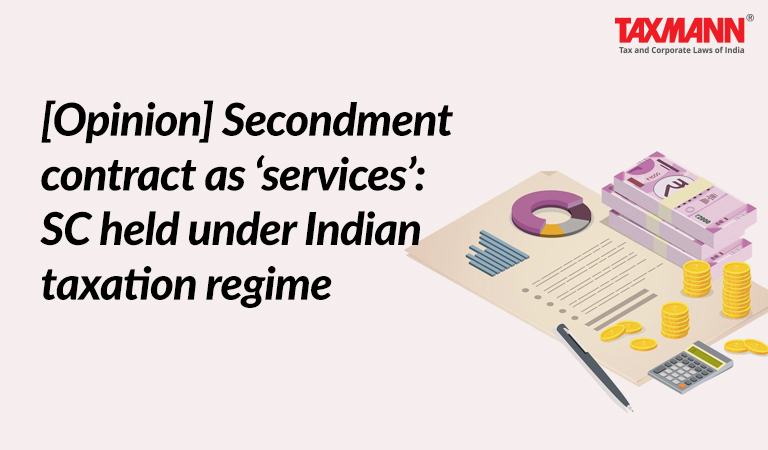[Opinion] Secondment contract as ‘services’: SC held under Indian taxation regime
- News|Blog|GST & Customs|
- 2 Min Read
- By Taxmann
- |
- Last Updated on 28 November, 2022

Neha Sinha – [2022] 145 taxmann.com 126 (Article)
Background
Secondment of employees have become increasingly popular amongst corporate entities which enter into secondment arrangements to leverage the expert knowledge and specific skill sets. The seconded employees work on a deputation basis in the seconded companies they are seconded to which require their technical expertise on certain matters. Since the seconded employee works for the seconded company during the secondment period, a pertinent question arises on whether the seconded employee becomes an employee of the seconded company. If yes, then what are the likely implications in the context of service tax.
In the recent case of CC, CE & ST v. Northern Operating Systems (P.) Ltd. [2022] 138 taxmann.com 359/92 GST 792, the Supreme Court (“Court”) answered the question if secondment contracts had the effect of contract of service or contract for service for the taxability under Finance Act, 1994.
In the Finance Act, 1994, before the amendment introduced in 2012, a service provided by a manpower recruitment or supply or recruitment agency was a taxable service under section 65(105)(k). ‘Manpower recruitment or supply agency‘ refers to any person engaged in providing any service or recruitment or supply of manpower. With the amendment in 2012, section 65B laid down a negative list of activities/arrangements which are excluded from the scope of ‘service’ and are not taxable. All activities carried out by one person for another for consideration are deemed services. A contract of service, i.e., employer-employee arrangement is excluded from the ambit of ‘service’ in terms of section 65B(44) of Finance Act, 1994.
In the present case, the assessee had entered into a secondment contract with its overseas group companies whereby the overseas group company deployed its experts to the assessee on a secondment. The seconded employees continued to be in the payroll of the overseas company and it paid the salary to those seconded employees during the secondment, however, the overseas company was reimbursed by the assessee for such salary paid. The assessee was charged service tax under the ‘reverse charge mechanism’ for the services it received from the overseas company with respect to its seconded employees. Refuting the taxability of the service, the assessee contended that under the secondment agreement, the seconded employees came under the control and supervision of the assessee, thus creating an employer-employee relationship between the assessee and the seconded employees which is outside the purview of the service tax regime.
To determine the taxability of service, the Court had to answer two questions-
(i) what was the true nature of the relationship between the seconded employees and the assessee?
(ii) what was the nature of the service provided by the seconded employees to the assessee?
Click Here To Read The Full Article
Disclaimer: The content/information published on the website is only for general information of the user and shall not be construed as legal advice. While the Taxmann has exercised reasonable efforts to ensure the veracity of information/content published, Taxmann shall be under no liability in any manner whatsoever for incorrect information, if any.

Taxmann Publications has a dedicated in-house Research & Editorial Team. This team consists of a team of Chartered Accountants, Company Secretaries, and Lawyers. This team works under the guidance and supervision of editor-in-chief Mr Rakesh Bhargava.
The Research and Editorial Team is responsible for developing reliable and accurate content for the readers. The team follows the six-sigma approach to achieve the benchmark of zero error in its publications and research platforms. The team ensures that the following publication guidelines are thoroughly followed while developing the content:
- The statutory material is obtained only from the authorized and reliable sources
- All the latest developments in the judicial and legislative fields are covered
- Prepare the analytical write-ups on current, controversial, and important issues to help the readers to understand the concept and its implications
- Every content published by Taxmann is complete, accurate and lucid
- All evidence-based statements are supported with proper reference to Section, Circular No., Notification No. or citations
- The golden rules of grammar, style and consistency are thoroughly followed
- Font and size that’s easy to read and remain consistent across all imprint and digital publications are applied



 CA | CS | CMA
CA | CS | CMA
